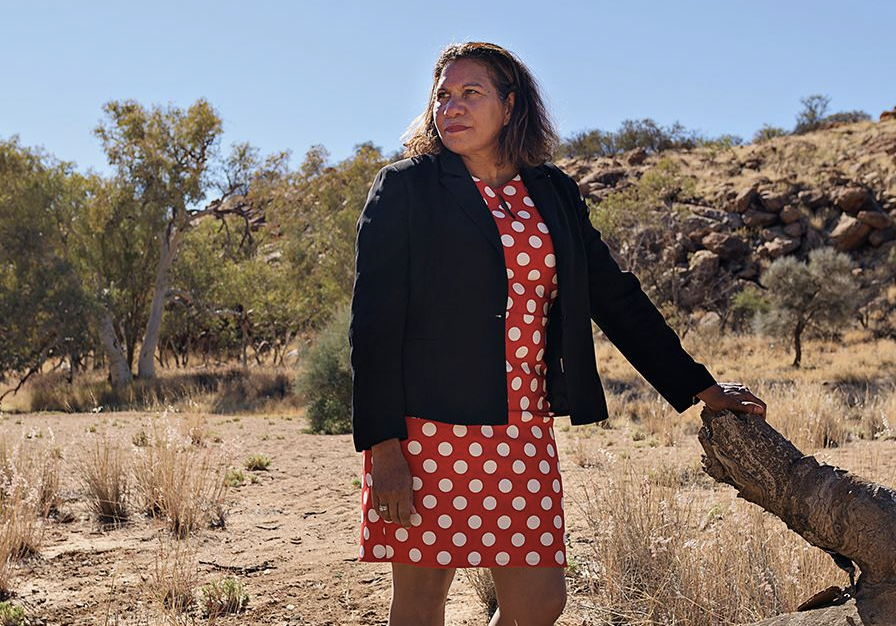
Leanne Liddle is set to transform the Northern Territory justice system.
As Director of the Aboriginal Justice Unit in the Northern Territory’s Department of the Attorney-General and Justice, Flinders University Law graduate Leanne Liddle (LLB/LP (GradEntry) ’04) is set to drive fundamental and significant change by introducing an Aboriginal Justice Agreement.
An Arrernte woman from Alice Springs, Leanne was eighteen when she travelled to Adelaide to become a police officer. She was the first female Aboriginal officer to graduate from the Fort Largs Academy in 1988. But after a difficult decade of discrimination she left, drawing on her courage to raise a racial discrimination case through the Federal Court.
The case ended with a confidential out of court settlement, and while it marked the end of her tenure in the police force, it only fuelled her quest to fight for justice and fairness, prompting her to study law at Flinders University.
A DESIRE TO MAKE A DIFFERENCE
‘What happened in the police force took away my ability to pursue that particular career, but it didn’t stop my desire to do something that could make a difference,’ says Leanne.
‘My racial discrimination case going through the court system allowed me to see justice at play, and that the justice system needed auditing. I also saw that once you got to court, you needed talented people at the table to represent you. I wanted to become that person.’
STUDY FUELLED BY PURPOSE AND PASSION
Leanne’s arrival at Flinders University in 2001 as a mature aged Law student, fuelled by purpose and passion, signalled an opportunity for her to excel. Juggling full-time studies with part-time work, Leanne was appreciative of the support from her lecturers and from the Yunggorendi Student Engagement centre at the University.
After graduating, Leanne chose not to go into practice as a solicitor, which many had expected her to do. Instead, she went into key bureaucratic roles to inform government and legal policy.
‘That’s where the real change can occur,’ she explains.
THE NEED FOR AN ABORIGINAL JUSTICE AGREEMENT
Over the past three years Leanne has certainly put this belief of being able to make a real change into action, travelling extensively across the Northern Territory to meet with Aboriginal communities to discuss details and possibilities for the Aboriginal Justice Agreement.
The situation she is addressing is daunting: 85% of adult prisons in the Northern Territory (which are at capacity) are filled with Aboriginal people, while 100% of the juvenile detention population is Aboriginal – yet Aboriginal people comprise only 30% of the Territory’s population.
They also make up 88% of the NT’s homelessness figures and experience staggering rates of chronic illness and poor education outcomes.
‘Look at the numbers. We can’t pretend there’s nothing wrong,’ says Leanne. ‘But if you look closer, there’s complexity to unravel – 60% of offences relate to alcohol and 40% of offences are triggered by unprocessed trauma and grief. We need new ways of addressing these issues and offering programs that work.’
DATA INFORMS AGREEMENT
To draft an accurate picture for change, Leanne and her team have obtained extensive data from the Australian Bureau of Statistics and are working with the nation’s top criminologists to decipher crucial patterns in the statistics.
They have learned that the very first contact between Aboriginal people and police will set a pathway for future interactions in the justice system, and this is where Leanne says fundamental change must begin.
APPETITE FOR CHANGE
She has also been able to read community appetite for change through working in prisons and listening to prisoners talk about how they believe their lives and patterns of reoffending can change.
Through the Agreement, Leanne plans to introduce early intervention programs to prevent offending, and alternatives to prison such as residential facilities, with tailored rehabilitation for eligible offenders.
She also wants to see a return to community courts, where Elders play a part in sentencing, and the funding of local law groups is led by trusted local voices.
‘They’re never going to be able to control the safety of their community if they’re not empowered and supported to drive that change.’
THE TIME IS RIGHT
Launched in August 2021, Leanne says the Aboriginal Justice Agreement includes deliverables that are attainable and practical. She is confident that all outcomes will be realised within five years.
‘I believe the time is right for this fundamental and significant change to occur and we have many good people to work with us on the journey to make it happen,’ says Leanne.
Leanne Liddle received a 2021 Distinguished Alumni Award for her distinguished leadership and commitment to justice over the past 30 years including the Aboriginal Justice Agreement for the Northern Territory. Read more on the Flinders University Alumni Awards

